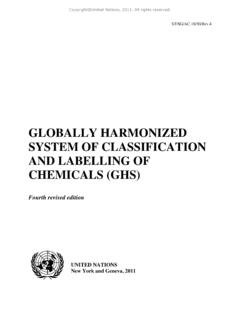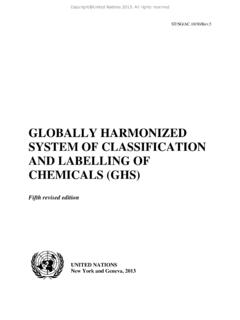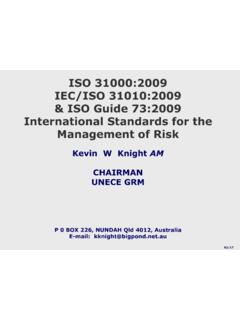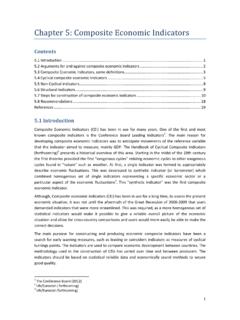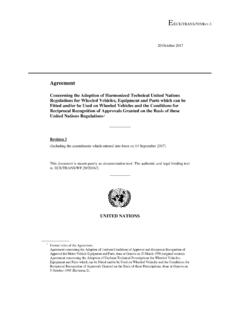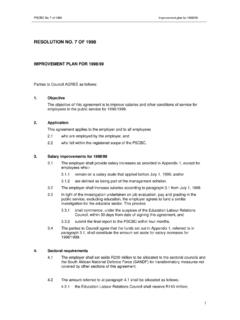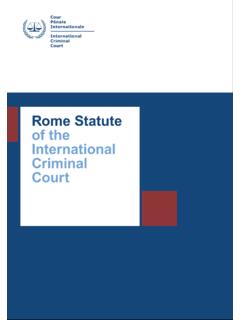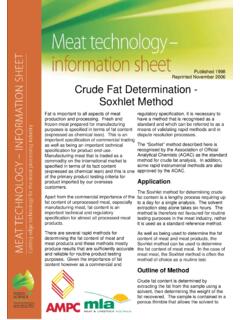Transcription of ECE
1 Economic Commission for Europe Inland Transport Committee World Forum for Harmonization of Vehicle Regulations Consolidated resolution on the Construction of Vehicles ( ) Revision 3 This revised consolidated version of the resolution on the Construction of Vehicles ( ) replaces and its amendments 1 to 4. and contains all the amendments adopted so far by the World Forum for Harmonization of Vehicle Regulations ( ). It has been completed by references to UN Regulations annexed to the 1958 Agreement, a standard annex on the "H" point and the actual torso angle for seating position, the list of distinguishing numbers of Contracting Parties, new guidelines on measures ensuring the audibility of hybrid and electric vehicles, recommendation on market fuel quality and design principles for Advanced Driver Assistance Systems (ADAS). This document was adopted by the World Forum for Harmonization of Vehicle Regulations ( ) at its 161st session.
2 United Nations ECE/ Economic and Social Council Distr.: General 23 January 2014 Original: English ECE/ 2 Consolidated resolution on the Construction of Vehicles ( ) Contents Page Preamble .. 3 Introduction .. 4 1. Definitions of vehicles .. 5 2. Classification of power-driven vehicles and trailers .. 6 3. Scope of UN Regulations annexed to the 1958 Agreement .. 13 4. Active safety requirements .. 32 5. Passive safety requirements .. 33 6. Requirements for the protection of the environment .. 34 7. General safety requirements .. 35 8. Recommendations .. 35 Annexes 1 Standard Annex on the procedure for determining the "H" point and the actual torso angle for seating positions in motor vehicles .. 70 Appendix 1 - Description of the three-dimensional "H" point machine (3-D H machine) .. 76 Appendix 2 - Three-dimensional reference system .. 79 Appendix 3 - Reference data concerning seating positions.
3 80 2 Guidelines on measures ensuring the audibility of hybrid and electric vehicles .. 81 3 Distinguishing number of contracting parties to the 1958 agreement in the approval mark .. 83 4 Recommendation on market fuel quality .. 84 Appendix 1 - Gasoline properties .. 86 Appendix 2 - Diesel properties .. 87 Appendix 3 - Housekeeping .. 89 5 Design principles for Control Systems of Advanced Driver Assistance System (ADAS) .. 90 Appendix: Human-Machine Interaction (HMI) - Considerations for Control Systems of ADAS .. 96 ECE/ 3 Preamble The World Forum for Harmonization of Vehicle Regulations, Desiring to establish the greatest uniformity in the UN Regulations, rules and recommendations relating to the construction of vehicles, to improve road safety and the protection of the environment, and to facilitate international road traffic and trade in vehicles and their equipment and parts, Bearing in mind that the provisions of the Convention on Road Traffic of Vienna, 8 November 1968 and of the European Agreements supplementing that Convention provide the basis for harmonization of the performance requirements, Bearing in mind also that the provisions of the Agreement concerning the Adoption of Uniform Technical Prescriptions for Wheeled Vehicles, Equipment and Parts.
4 Which can be Fitted and/or be Used on Wheeled Vehicles and the Conditions for Reciprocal Recognition of Approvals Granted on the Basis of these Prescriptions, done at Geneva on 20 March 1958 ("1958 Agreement") provides further possibilities for harmonization, Bearing in mind that the Special resolution No. 1 concerning the common definitions of vehicle categories, masses and dimensions ( )1 setting forth common definitions, to be used in the global technical regulations established under the framework of the Agreement concerning the establishing of global technical regulations for wheeled vehicles, equipment and parts which can be fitted and/or be used on wheeled vehicles, done in Geneva on 25 June 1998 (" 1998 Agreement"), does not apply to the UN Regulations annexed to the 1958 Agreement, Noting that the application of the provisions of the 1958 Agreement still leave open the possibility of divergences between one country and another as regards some issues when they establish domestic rules for vehicles design and for the protection of the environment, Recommends Governments, in order to eliminate these divergences as far as possible, to align their domestic legislation with the recommendations of the Consolidated Resolutions and the provisions of the above-mentioned Agreements, applying them forthwith to the fullest extent possible.
5 1 as amended by ECE/ ECE/ 4 Introduction The text hereafter updates the recommendations of the Consolidated resolution on the Construction of Vehicles and provides information on the legal texts under the framework of the 1958 Agreement (UN Regulations, Rules and specific requirements) applicable in the vehicle design, aiming the improvement of safety and the protection of the environment. Paragraphs 1. and 2. contain general definitions and the classification used in the documents referred. Paragraph 3. indicates the scope of the UN Regulation(s) and Rule(s). Tables of paragraphs 4. to 7. contain the main requirements for the construction of vehicles so far established and already included into UN Regulation(s) and Rule(s) by the World Forum. Similar requirements are grouped. For any requirement or group of requirements, references are made to the relevant UN Regulations, identified by the number allocated to them by the 1958 Agreement, to the still valid recommendations reproduced in paragraph 8.
6 And to the Standard Annexes to UN Regulations reproduced in annexes to this resolution . Annex 3 includes, as complementary information, an updated list of the distinguishing numbers allocated to Contracting Parties by the 1958 Agreement. Annex 4 includes the recommendation on market fuel quality and Annex 5 contains the design principles for control systems of Advanced Driver Assistance Systems (ADAS). ECE/ 5 1. Definitions of vehicles2 "Power-driven vehicle" means any self-propelled road vehicle, other than a moped in the territories of Contracting Parties which do not treat mopeds as motor cycles, and other than a rail-borne vehicle. "Motor vehicle" means any power-driven vehicle which is normally used for carrying persons or goods by road or for drawing, on the road, vehicles used for the carriage of persons or goods. This term embraces trolley-buses, that is to say, vehicles connected to an electric conductor and not rail-borne.
7 It does not cover vehicles such as agricultural tractors, which are only incidentally used for carrying persons or goods by road or for drawing, on the road, vehicles used for the carriage of persons or goods. "Motor cycle" means any two-wheeled vehicle, with or without side-car, which is equipped with a propelling engine. Contracting Parties may also treat as motor cycles in their domestic legislation three-wheeled vehicles whose unladen mass does not exceed 400 kg. The term "motor cycle" does not include mopeds, although Contracting Parties may treat mopeds as motor cycles for the purpose of the Convention. "Moped" means any two-wheeled or three-wheeled vehicle which is fitted with an internal combustion engine having a cylinder capacity not exceeding 50 cm3 and a maximum design speed not exceeding 50 km per hour. "Trailer" means any non-self propelled vehicle, which is designed and constructed to be towed by a power driven vehicle and includes semi trailers.
8 "Combination of vehicles" means coupled vehicles which travel on the road as a unit. "Articulated vehicle" means a combination of vehicles comprising a motor vehicle and semi trailer coupled to the motor vehicle. "Road tractor" means road motor vehicle designed, exclusively or primarily, to haul other road vehicles which are not power-driven (mainly semi trailers). "Agricultural tractor" means a vehicle specifically designed to deliver a high tractive effort at slow speeds, for the purposes of hauling a trailer or machinery. "Manufacturer" means the person or body who is responsible to the Type Approval Authority (TAA) for all aspects of the type approval process and for ensuring the conformity of production. It is not essential that the person or body is directly involved in all stages of the construction of the vehicle or component which is the subject of the approval process.
9 2 According to the Convention on Road Traffic of Vienna, 8 November 1968 and of the European Agreements supplementing that Convention, except paragraph , taken from OECD "Glossary of statistical terms" ECE/ 6 2. Classification of power-driven vehicles and trailers3 Category L Motor vehicles with less than four wheels "Category L1": A two-wheeled vehicle with an engine cylinder capacity in the case of a thermic engine not exceeding 50 cm3 and whatever the means of propulsion a maximum design speed not exceeding 50 km/h. "Category L2":A three-wheeled vehicle of any wheel arrangement with an engine cylinder capacity in the case of a thermic engine not exceeding 50 cm3 and whatever the means of propulsion a maximum design speed not exceeding 50 km/h. "Category L3": A two-wheeled vehicle with an engine cylinder capacity in the case of a thermic engine exceeding 50 cm3 or whatever the means of propulsion a maximum design speed exceeding 50 km/h.
10 "Category L4": A vehicle with three wheels asymmetrically arranged in relation to the longitudinal median plane with an engine cylinder capacity in the case of a thermic engine exceeding 50 cm3 or whatever the means of propulsion a maximum design speed exceeding 50 km/h (motor cycles with sidecars). "Category L5": A vehicle with three wheels symmetrically arranged in rela-tion to the longitudinal median plane with an engine cylinder capacity in the case of a thermic engine exceeding 50 cm3 or whatever the means of propulsion a maximum design speed exceeding 50 km/h. "Category L6": A vehicle with four wheels whose unladen mass is not more than 350 kg, not including the mass of the batteries in case of electric vehicles, whose maximum design speed is not more than 45 km/h, and whose engine cylinder capacity does not exceed 50 cm3 for spark (positive) ignition engines, or whose maximum net power output does not exceed 4 kW in the case of other internal combustion engines, or whose maximum continuous rated power does not exceed 4 kW in the case of electric engines.


